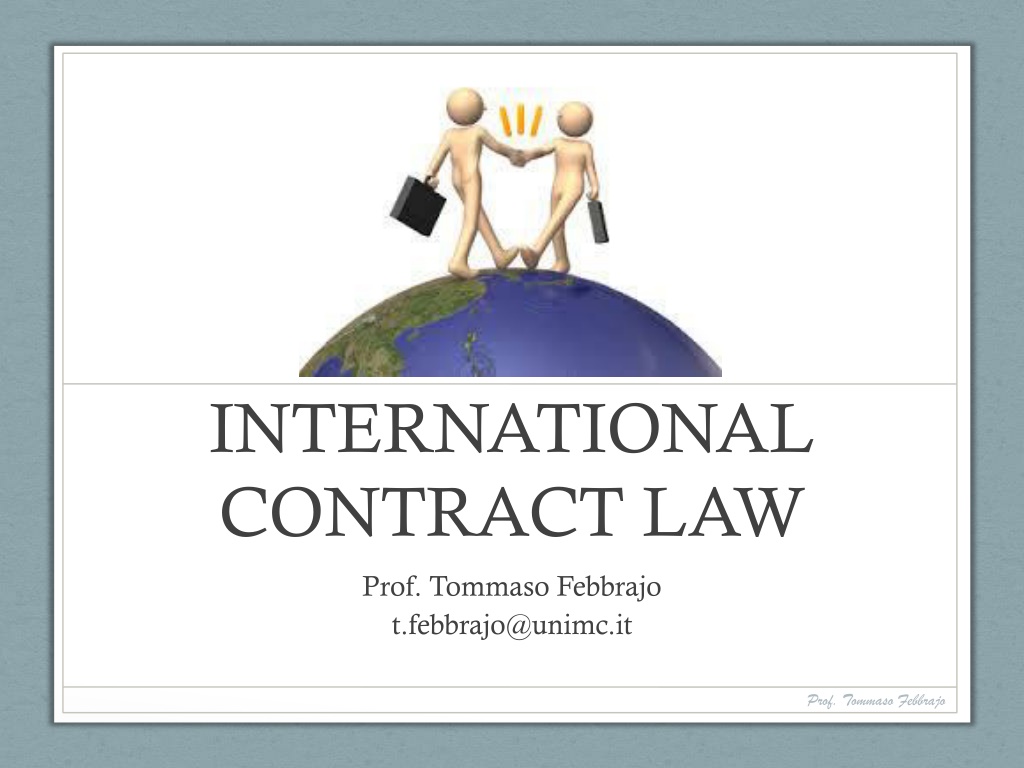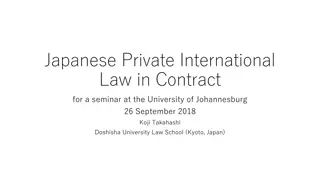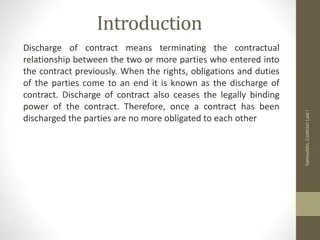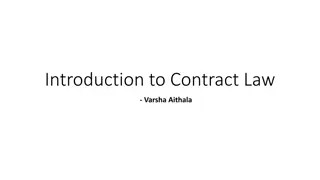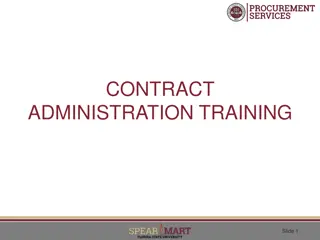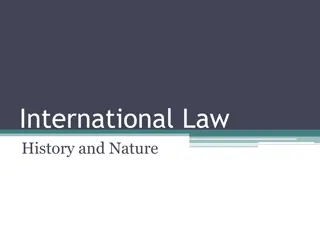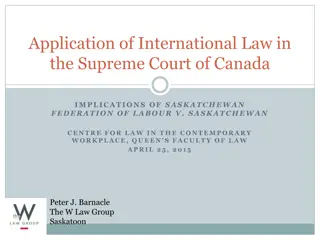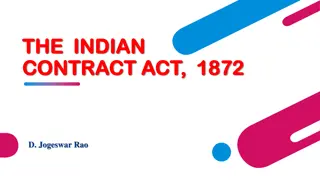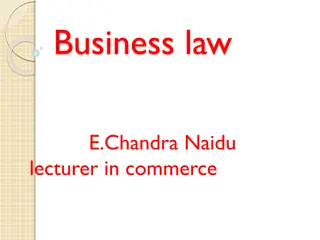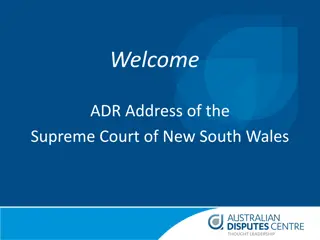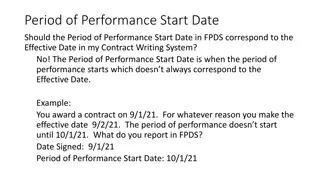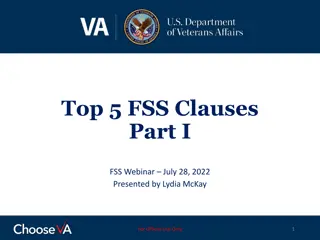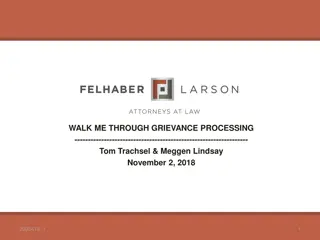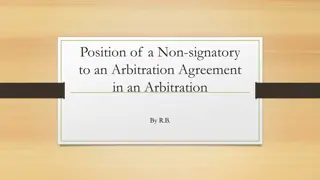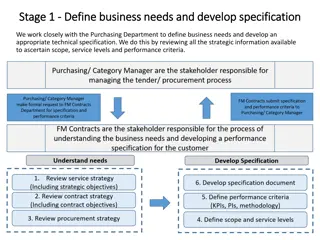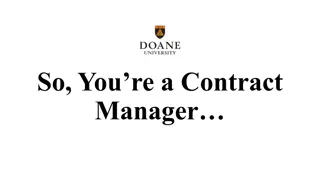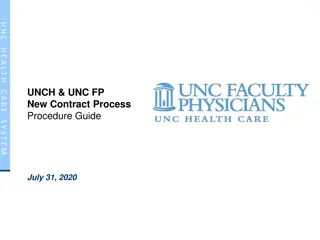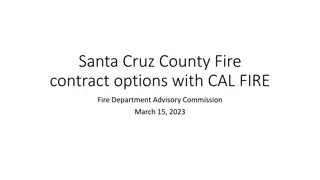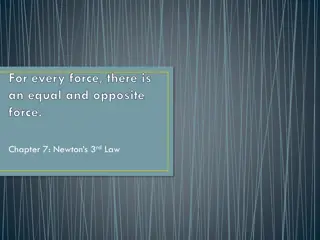Understanding International Contract Law with Prof. Tommaso Febbrajo
Delve into the realm of international contract law with Prof. Tommaso Febbrajo as he explores the definition, importance, and challenges associated with drafting and dealing with international contracts. Discover the significance of clear agreements in cross-border transactions and the impact of different legal systems on such arrangements.
- International Contract Law
- Prof. Tommaso Febbrajo
- Cross-Border Agreements
- Legal Systems
- Drafting Contracts
Download Presentation

Please find below an Image/Link to download the presentation.
The content on the website is provided AS IS for your information and personal use only. It may not be sold, licensed, or shared on other websites without obtaining consent from the author. Download presentation by click this link. If you encounter any issues during the download, it is possible that the publisher has removed the file from their server.
E N D
Presentation Transcript
INTERNATIONAL CONTRACT LAW Prof. Tommaso Febbrajo t.febbrajo@unimc.it Prof. Tommaso Febbrajo
Chapter II DRAFTING INTERNATONAL CONTRACTS Prof. Tommaso Febbrajo
INTRODUCTION Prof. Tommaso Febbrajo
INTERNATIONAL CONTRACT: DEFINITION A transaction international if elements of more than one country are involved will qualify to be International contract law concerns the legal rules relating to cross-border agreements. Prof. Tommaso Febbrajo
The importance of contracts in international transactions The absence of a contract continues to be a regrettably common state of affairs. Companies, believing themselves to be protected by a long- term commercial relationship based on mutual trust, make no provision for a written statement of each party s obligations. The contract may be incomplete or imprecise; in other words, one or more essential clauses relating to matters such as payment deadlines and methods, the applicable law or the court of jurisdiction may have been omitted. Prof. Tommaso Febbrajo
The importance of contracts in international transactions Whether there is no contract or an incomplete contract, the consequences can be very serious, possibly even compromising relations between the parties as well as having significant financial consequences. Contracts are essential means of guaranteeing compliance with obligations and ensuring acceptance of them by both parties. commercial Prof. Tommaso Febbrajo
ISSUE N. 1 DEALING WITH VARIOUS LEGAL SYSTEMS Prof. Tommaso Febbrajo
The legal systems: international framework
How to deal with the various legal system The English common-law tradition is tending to prevail in international transactions. Prof. Tommaso Febbrajo
Common law vs Civil law 1. Source of law Common law Civil law Mainly from case law from previous (Judgments of the Courts are binding- stare decisis) Mostly based on codified legislation. Case law are not binding judgments Codes are concised and set out mainly broad principles Statutes are detailed with definitions and lengthy enumeration specific applications and exceptions contain of Prof. Tommaso Febbrajo
Common law vs Civil law 2. Interpretation of contract Common law Civil law Full respect of freedom of contract Sanctity contract Relevance of good faith and fairness rules freedom of contract of against Primary focus on the written words in the contract Primary focus on the wider context and intentions of the parties Parol evidence rule Prevent a party to a written contract from presenting evidence that contradicts or adds to the written terms of the contracts that appears to be whole extrinsic Not meaning Evidence of negotiation is admissible limited to literal words. of the Prof. Tommaso Febbrajo
How to deal with the various legal system In a civil law system rights and obligations arise from a statute book constructed in the form of codes, general concepts that are subsequently interpreted by courts or administrative authorities. Common law is a casuistic system, in which norms are established on a case-by- case basis. which comprise Prof. Tommaso Febbrajo
How to deal with the various legal system: civil law Contracts usually contain a preamble of statements describing the process by which the parties arrived at the agreement. It may serve as a means obligations set out in the body of the contract. of interpreting the Prof. Tommaso Febbrajo
Example: Civil law sales agreement Sales agreement Mr. Bean, __________ And Mr. Brown, _________ Premises (Recitals) Whereas, Mr. Brown is the owner of an old Fiat 500 which no longer needs. Whereas, Mr. Bean needs a car to go to work Therefore, parties agree as follow: Mr. Brown sells his fiat 500 to Mr. Bean for the price of 1000. . Prof. Tommaso Febbrajo
Premises (Recitals) Its purpose is to state information that forms the foundation or background for the contract. Prof. Tommaso Febbrajo
How to deal with the various legal system: common law Common law contracts tend not to insert preambles, and indeed the content of a preamble is null and void. The practice of English courts, however, is based on literal interpretation , which means that each word of each clause has its own significance. In order to clarify the terms used by the parties and to facilitate the administration of the contract, authors of English contracts insert a set of definitions. Prof. Tommaso Febbrajo
ISSUE N. 2 WHICH LAW APPLIES TO THE CONTRACT? Prof. Tommaso Febbrajo
The governing law: introduction Every (national or international) contract must have a governing law The governing law sets forth the necessary rules on contract formation: when (and under which prerequisites) will a contract come into existence? Prof. Tommaso Febbrajo
The governing law: introduction A purely domestic contract (ex. between two italian firms) is governed by the respective national law: a choice of foreign law is not permitted. The choice of the governing law of a contract becomes in particular relevant on the international level. Whenever a contract has links to more than one legal order, courts in charge of resolving a contractual dispute must determine which law will govern the contract. Prof. Tommaso Febbrajo
The governing law: introduction Example: A contract with a Dutch company. In the event of a contractual dispute, courts must decide whether German or Dutch substantive laws apply. German company concludes a commercial Prof. Tommaso Febbrajo
ISSUE N. 2 WHICH ROLE HAS THE APPLICABILE LAW? Prof. Tommaso Febbrajo
The role of governing law Starting point: Assume two companies, that are domiciled in different international sales contract countries, conclude an Prof. Tommaso Febbrajo
The role of governing law Typical provisions in an international sales contract: Description of the contractual goods Contract price Delivery terms Payment terms Warranty periods Available remedies in case of breach Governing law of the contract (Choice of Law) /Jurisdiction Agreement or Arbitration Agreement Prof. Tommaso Febbrajo
The role of governing law What is left for the governing law once the contract is concluded? Prof. Tommaso Febbrajo
The roles of governing law: a) gap filler The governing law operates as a gap filler : legal issues arising out of a contractual relationship that are not addressed by the contract must be resolved by the governing law As a consequence, the governing law becomes less important once the parties have with duties, rights and possible legal consequences in case of any breach. extensively dealt The more the contract is complete, the less governing law is important Prof. Tommaso Febbrajo
The role of governing law: gap filler Governing law will, in the absence of contractual provisions, determine: the scope of contractual obligations the applicable remedies in case of a contract breach (and their preconditions) the extent and duration of liability of the parties in case of breach. Prof. Tommaso Febbrajo
The roles of governing law: a) gap filler. Case Study I The English company E orders certain production machinery from the German manufacturing company D. The order submitted to D indicates the type of the equipment, the contract price, the requested delivery dates and contains also a choice of law provision as follows: This order and the sales contract concluded hereunder shall be governed by English law". D confirms the order towards E without any further reservation. However, due to problems with the sourcing of necessary raw materials, D fails to deliver the contractual goods on time. As a consequence, E terminates the contract without granting a grace period and claims damages. Prof. Tommaso Febbrajo
Case Study I. Solution English law does in principle permit the termination of a (sales) contract in case of any (even delivery. a short) delay in Contrary to Dutch or German law, in english law, the buyer is accordingly (in the absence of a contract provision stipulating otherwise) not required to set a grace period (a further period of time in wich is still possibile to fulfill obligations) as a condition precedent for a withdrawal from the contract A breach of contract governed by English law does (contrary to other legal systems in Europe) not require fault on part of the party in breach. Prof. Tommaso Febbrajo
The role of governing law: a) gap filler. Case Study II The Dutch distributor D buys certain products from the UK manufacturer E. The contract contains only a description of the contract goods and the agreed contract price. The contractual goods delivered by E are defective. D demands the delivery of substutite products or the repair of the delivered products. E refuses to make good the defect. Can D enforce perfomance claims in front of a court that has jurisdiction for the case? Prof. Tommaso Febbrajo
Case Study II. Solution If the sales contract is governed by English law, cannot claim performance (by means of repair or delivery of substitute goods) given that common law does not acknowledge a right of specific performance . D If the contract would be governed by Dutch (or another civil law State) law, D would be entitled to enforce a claim for specific performance. Prof. Tommaso Febbrajo
Private international law National International laws of their State to determine the applicable law of the contract in case of an internationa dispute. courts must apply the Private Prof. Tommaso Febbrajo
Private international law Private international law, also called conflict of laws, consists of legal norms that determine three types of issues: 1) which state court has jurisdiction in private matters having cross - border implications, 2) which state law is applicablein such matters and 3) under which conditions may a foreign decision be recognised and enforced in another country. Each state has its own private international law system A global civil code does not exist Prof. Tommaso Febbrajo
Harmonization of international law However, different laws has been harmonized on the international level: - On the European level From 18 December 2009 onwards, Private Internationa law is harmonized also in relation to (international) relationships. contractual Every court residing within the EU must apply the Rome I Regulation. Prof. Tommaso Febbrajo
ISSUE N. 3 CHOICE OF JURISDICTION Prof. Tommaso Febbrajo
The Jurisdiction in an international contract In a transaction with no foreign element involved it will not usually be necessary to specify the courts which have jurisdiction in the event of a dispute. However, where there are international aspects to the transaction, it is sensible to set out in the contract the jurisdiction i.e in which Country s courts will decide any dispute between the parties. Prof. Tommaso Febbrajo
The Jurisdiction in an international contract A jurisdiction clause therefore states that the parties have agreed to the courts of a named country taking jurisdiction over (in other words, having the right to hear) any disputes that may arise. Es. "The parties submit all their disputes arising out of or in connection with this Agreement to the exclusive jurisdiction of the Courts of [ ]". Prof. Tommaso Febbrajo
PROBLEMS RELATED TO THE CHOICE OF JURISDICTION I Prof. Tommaso Febbrajo
Enforcement of a foreign judgment The parties may wish to submit to the exclusive jurisdiction of the courts of one country. This may not be wise where one party has material assets in another country, or it may be necessary to obtain immediate enforcement of contractual obligations in that other country. Prof. Tommaso Febbrajo
Example An English company signs a contract for the supply of goods to a company in China. The contract is governed by English law and have any dispute decided by the English courts. If the Chinese company has no assets in England and fails to comply with a sentence against it for damages, the English company would then have to try to enforce the English judgment in the Chinese courts. Prof. Tommaso Febbrajo
Enforcement of a foreign judgment The enforcement of foreign judgments is the recognition and enforcement in one jurisdiction of judgments rendered jurisdiction. in another ("foreign") Foreign judgments may be recognized (i.e. accepted) based on bilateral or multilateral treaties or understandings. Prof. Tommaso Febbrajo
Enforcement of a foreign judgment For exemple, the recognition and enforcement of EU judgments are governed by Regulation (EU) 1215/2012 on jurisdiction and the recognition and enforcement of judgments in civil and commercial matters (c.d. Brussels I bis Regulation). This new Regulation sets out the conditions, based on which a judgement will be recognized and enforced in other Member States.The purpose of the new Regulation is to improve and facilitate the free circulation of judgments and to further enhance access to justice. Prof. Tommaso Febbrajo
Enforcement of a foreign judgment In the absence of such Treaties, the outcome of the recognition of a foreign ruling remains unpredictable. Bottom line: In drafting the jurisdiction clause, these aspects considered very carefully. have to be Prof. Tommaso Febbrajo
PROBLEMS RELATED TO THE CHOICE OF JURISDICTION II Prof. Tommaso Febbrajo
The jurisdiction clause is ignored by the Courts Despite the presence of a jurisdiction clause, there is always a risk that one of the parties will ignore the terms in the contract and start proceedings in another jurisdiction and the Court seized allows action to go ahead. Prof. Tommaso Febbrajo
Example In the case outlined above, if the Chinese company is unhappy with the quality of goods, it might start an action in the Chinese courts and the judge might decide to allow the case to go ahead even if the contract stipulates that the English courts have jurisdiction. Prof. Tommaso Febbrajo
ISSUE N. 4 HOW RESOLVE DISPUTES BETWEEN PARTIES Prof. Tommaso Febbrajo
Dispute resolution mechanisms Basically, there are two dispute resolution mechanisms: Arbitration Litigation Arbitration Prof. Tommaso Febbrajo
Litigation In litigation process, a case (called suit or lawsuit) is brought before a public Court of law suitably empowered (having the jurisdiction) to hear the case, by the parties involved resolution (the judgment). (the litigants) for Possibility of appeal the judgment. Prof. Tommaso Febbrajo
Arbitration Is a form of alternative dispute resolution (ADR). The parties to a dispute refer it to arbitration, which means that the dispute will be decided by one or more persons (the "arbitrators", or "arbitral tribunal"), and the parties agree to be bound by the arbitral decision (the "award"). An arbitrator is not a professional Judge. Prof. Tommaso Febbrajo
Arbitration clause In order to have the dispute ruled by arbitrators, a specific contract is needed: clause in the Es. Any controversy or claim arising out of or relating to this contract, shall be settled by arbitration administered by the [American Arbitration Association/ International Chamber of Commerce] under its rules. The number of arbitrators shall be [one or three]. The place of arbitration shall be [city, state]. [State] law shall apply. Prof. Tommaso Febbrajo
